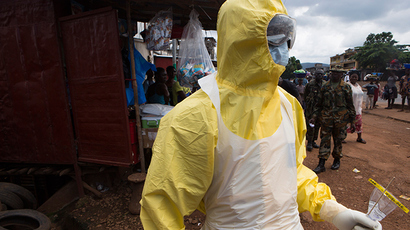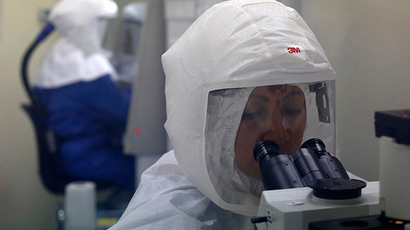‘I am a Liberian, not a virus’ campaign fights Ebola stigma plaguing West Africans
A grassroots campaign growing in the United States is aiming to eradicate the stigmatization that people of West African descent are increasingly seeing amidst the most deadly Ebola virus outbreak ever.
As the fatal disease continues to ravage West African nations where it is believed to have caused more than 4,500 deaths this year, only two Americans so far have contracted the disease inside the US. Nevertheless, individuals from the nations currently at war with a major outbreak say they’re being singled out in the States because of their ethnicity, and now are attempting to defuse the growing discrimination with an online campaign.
Shoana Clarke Solomon, a Liberian-American photographer and TV host, appeals in YouTube clip uploaded to the video-sharing site earlier this month that the world must reject the notion that her ethnicity is analogous to Ebola.
According to what Solomon says in the 2-minute long “I am a Liberian, not a virus” video, she became devastated when her nine-year-old daughter recently came home from school and said she was told: “You’re from Liberia, so you have a disease.”
“I am hurt and upset,” Solomon says in the video. “We are Liberians, Sierra Leoneans, Guineans, and Nigerians. We live in a region that has been devastated by a deadly disease, but we’re not all infected. It is wrong to stereotype and stigamatize an entire people. Remember, we are human beings.”
#IAmALiberianNotAVirus! #Stigma hurts my sons, pleas #EndTheHate. pic.twitter.com/rtxqA2kfmn
— HIV Advocate Mom (@SaveRyanWhiteD) October 19, 2014
Soloman told The Root recently that the campaign got off the ground after four women met and began “talking about how frustrating it is to be looked at as if they were diseased or walking viruses from Liberia.” She added the imagery and, since October 13, has garnered nearly 20,000 hits on her YouTube video. Now other Liberian-Americans have adopted the #IamaLiberianNotaVirus hashtag to help the campaign grow, but face a hard-to-fight adversary that continues to be fueled by fear and misunderstanding.
Breaking the silence, changing the story! #IamaLiberiannotaViruspic.twitter.com/YJP04iGUJo
— Gertrude K (@TrudyloveK) October 20, 2014
“I place no blame on anyone for the stigma. It’s bound to happen, especially when people don’t take the time to learn the facts,” Soloman told The Root. “Ebola is a deadly virus that people know very little about. Radio and television are bombarding our homes with news about Ebola every minute. It’s accompanied by dramatic music and scary images. People are hearing about all the deaths and not paying attention to how you actually get the virus. I am also grateful for the media. It’s bringing much-needed attention to Liberia and other countries that need help with ending this epidemic. Without press coverage, this situation would be far ... worse.”
Wilhelmina from Myeonway Designs #IamALiberianNotAVirus#EbolaStigmapic.twitter.com/aP69efWih0
— Liberian Ent Awards (@LibEntAwards) October 14, 2014
In the meantime, Soloman added, she believes education will help eliminate the stigma that Liberian-Americans are currently experiencing.
“The purpose of this movement is simply to make people aware that even though this virus exists in our country, we are not all infected by it. We do not want our children to be stereotyped or discriminated against at school. Adults can better cope with the insults, but our children can be scarred for life. My 9-year-old has been insulted three times in two weeks for simply being a Liberian,” she said. “Liberians have suffered enough. First it was a civil war, which lasted 14 years. As if that was not enough, we now have the Ebola virus. By the way, we did not start the virus or invent it. On the contrary, it discovered us.”














